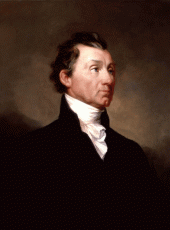To the House of Representatives:
Having duly considered the bill entitled "An act for the preservation and repair of the Cumberland road," it is with deep regret, approving as I do the policy, that I am compelled to object to its passage and to return the bill to the House of Representatives, in which it originated, under a conviction that Congress do not possess the power under the Constitution to pass such a law.
A power to establish turnpikes with gates and tolls, and to enforce the collection of tolls by penalties, implies a power to adopt and execute a complete system of internal improvement. A right to impose duties to be paid by all persons passing a certain road, and on horses and carriages, as is done by this bill, involves the right to take the land from the proprietor on a valuation and to pass laws for the protection of the road from injuries, and if it exist as to one road it exists as to any other, and to as many roads as Congress may think proper to establish. A right to legislate for one of these purposes is a right to legislate for the others. It is a complete right of jurisdiction and sovereignty for all the purposes of internal improvement, and not merely the right of applying money under the power vested in Congress to make appropriations, under which power, with the consent of the States through which this road passes, the work was originally commenced, and has been so far executed. I am of opinion that Congress do not possess this power; that the States individually can not grant it, for although they may assent to the appropriation of money within their limits for such purposes, they can grant no power of jurisdiction or sovereignty by special compacts with the United States. This power can be granted only by an amendment to the Constitution and in the mode prescribed by it.
If the power exist, it must be either because it has been specifically granted to the United States or that it is incidental to some power which has been specifically granted. If we examine the specific grants of power we do not find it among them, nor is it incidental to any power which has been specifically granted.
It has never been contended that the power was specifically granted. It is claimed only as being incidental to some one or more of the powers which are specifically granted. The following are the powers from' which it is said to be derived:
First, from the right to establish post-offices and post-roads; second, from the right to declare war; third, to regulate commerce; fourth, to pay the debts and provide for the common defense and general welfare; fifth, from the power to make all laws necessary and proper for carrying into execution all the powers vested by the Constitution in the Government of the United States or in any department or officer thereof; sixth and lastly, from the power to dispose of and make all needful rules and regulations respecting the territory and other property of the United States.
According to my judgment it can not be derived from either of those powers, nor from all of them united, and in consequence it does not exist.
Having stated my objections to the bill, I should now cheerfully communicate at large the reasons on which they are founded if I had time to reduce them to such form as to include them in this paper. The advanced stage of the session renders that impossible. Having at the commencement of my service in this high trust considered it a duty to express the opinion that the United States do not possess the power in question, and to suggest for the consideration of Congress the propriety of recommending to the States an amendment to the Constitution to vest the power in the United States, my attention has been often drawn to the subject since, in consequence whereof I have occasionally committed my sentiments to paper respecting it. The form which this exposition has assumed is not such as I should have given it had it been intended for Congress, nor is it concluded. Nevertheless, as it contains my views on this subject, being one which I deem of very high importance, and which in many of its bearings has now become peculiarly urgent, I will communicate it to Congress, if in my power, in the course of the day, or certainly on Monday next.
JAMES MONROE.
James Monroe, Veto Message Online by Gerhard Peters and John T. Woolley, The American Presidency Project https://www.presidency.ucsb.edu/node/208044

